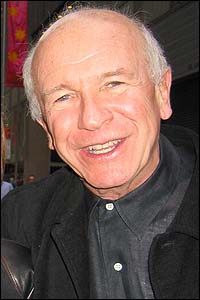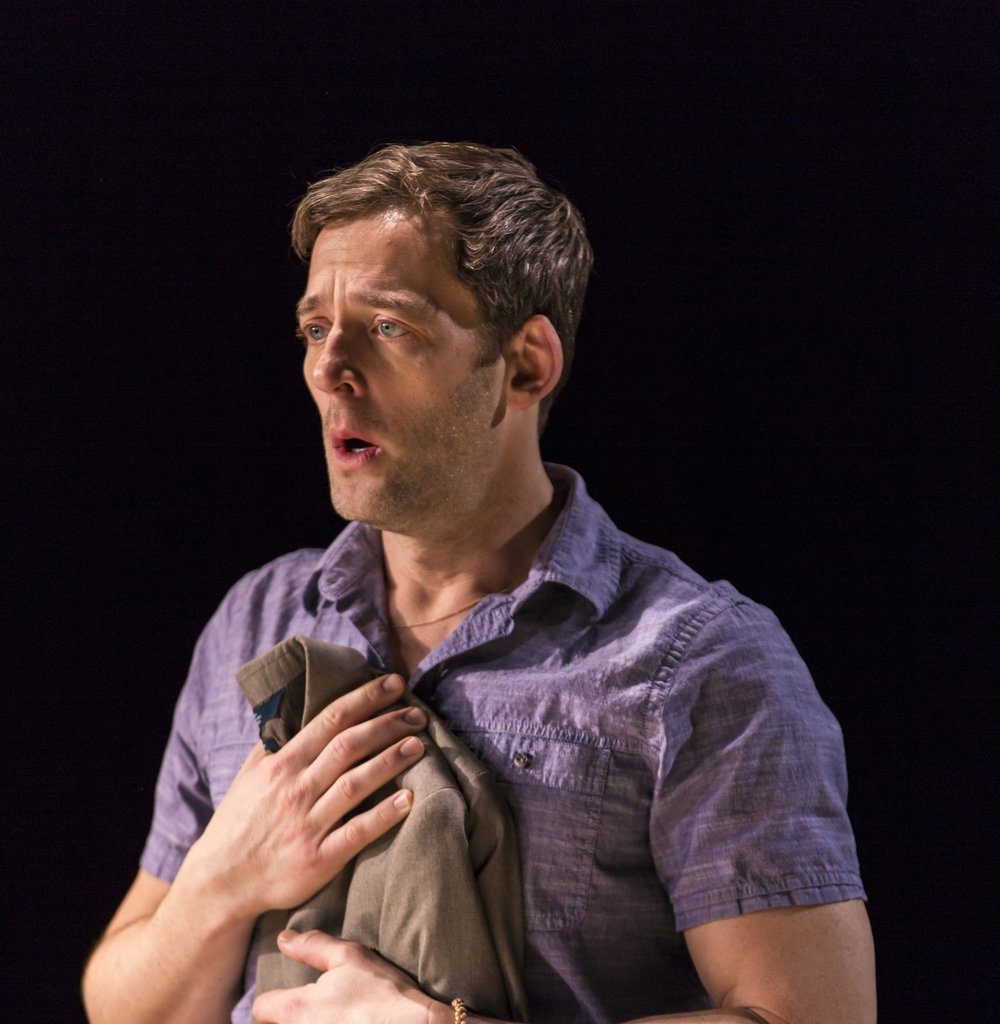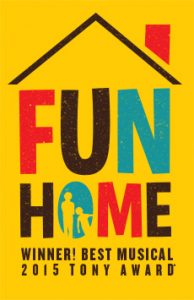 Fun Home
Fun Home
Based on the graphic novel by Alison Bechdel
Music by Jeanine Tesori, Book and lyrics by Lisa Kron
Boston Opera House, Oct. 17-29, 2017
IF THEATER is a temporary rearrangement of life to spark discovery, the musical Fun Home—the touring Broadway production is currently playing at the Boston Opera House—exceeds requirements, not only yielding insights but whipping up exuberance out of anguished chaos in the process. Based on cartoonist Alison Bechdel’s bestselling graphic memoir of the same name, Fun Home captures the perplexing atmosphere, searing revelations, and generous spirit of the original work, the story of an emerging lesbian artist and her closeted gay father, as their secrets are disclosed to a wider world, with all the risks implied. Playwright and performer Lisa Kron wrote the book and lyrics for the musical, and composer Jeanine Tesori wrote the score. Sam Gold directs.
This production is pitch-perfect. The musical numbers carry emotion and are well sung by an excellent cast, including Kate Shindle (Alison), Robert Petkoff (Bruce) and Susan Moniz (Helen). Even the Bechdel kids’ voices command attention. Efficient shifts of sets and lighting keep things moving without distraction, and the choreography manages even simultaneous scenes with aplomb. Fun Home is the first Broadway musical with an openly lesbian protagonist to win a Tony Best Musical award, and also the first winner written entirely by women. It is a hot-wired but still cerebral exploration of the human yearning to connect, and of home as the incubator for a creative life.
The story is set in rural Beech Creek, Pennsylvania, in the late 1960s to 1980, with the Bechdel of today 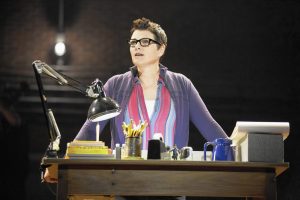 supplying narrative details and commentary as a constant onstage observer. Oddly enough, she opens Fun Home by divulging its ending: “[My father] killed himself … and I have become a lesbian cartoonist.” Immediately Bruce Bechdel appears, accompanied by his six- or seven-year-old child (“Small Alison”). As the pair begin digging through a box of discarded Irish lace curtains, they start rummaging through the family’s past as an entrée to their tightly entwined lives.
supplying narrative details and commentary as a constant onstage observer. Oddly enough, she opens Fun Home by divulging its ending: “[My father] killed himself … and I have become a lesbian cartoonist.” Immediately Bruce Bechdel appears, accompanied by his six- or seven-year-old child (“Small Alison”). As the pair begin digging through a box of discarded Irish lace curtains, they start rummaging through the family’s past as an entrée to their tightly entwined lives.
“Medium Alison,” a student at Oberlin College, adds anxious worries about her own sexual identity to the mix of volatility and confusion surrounding her father, who has kept his gay self secret while living the life of an English teacher, part-time mortician, husband to Helen, and co-parent of Alison and her two younger brothers. Restoring and decorating the family’s enormous, dilapidated, 19th-century house is Bruce’s overriding obsession. After the years-long renovation is finished, having completed court-ordered counseling for plying a minor with alcohol, and as his marriage is coming apart, he commits suicide. Alison’s attempt as an adult to understand how she and her father had been connected, and the elusive but real ways that he gave her support, are the main themes of this engrossing tale.
Fun Home avoids simple resolution of complexities, and the musical feels faithful to the tone and sense of Bechdel’s 2006 memoir. But memoir and musical are distinct forms. The memoir relied on an astonishing array of saved letters, notes, memorabilia, photos, news clips, and literary quotes to generate drawings and captions. The musical, on the other hand, displays not thoughts or images but behavior: it uses actors to tell the story. Thus while the detailed drawings are largely missing from the show, the musical exploits selected images as metaphors. Small Alison is lofted as an “airplane” on top of her father’s feet, symbolizing his easy, playful support; Alison and her little brothers jump in and out of a display coffin, suggesting sibling camaraderie; Helen’s intense playing of the family piano conveys her anger and bewilderment.
In the second place, the memoir is filled with literary reflections, as Alison constantly decodes novels her father is reading or sending to her for clues to his feelings—and her own. The books he favors suggest secrets and taboos: books by Proust, Fitzgerald, Colette. But if literary allusions run rife in the memoir, they are scoffed at in the musical. For example, Alison’s girlfriend Joan calls Bruce’s recommendation that she read Colette for guidance “weird.”
Of course, memoir and musical are fundamentally distinct forms—sketches with captions versus score and lyrics—and the musical requires serious compression of plot. In terms of overall emphasis, however, the 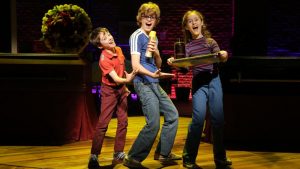 difference may be less than you’d think. In both renditions, for example, the Bechdel siblings are a decisive force. This is true in the memoir, where their incredulous faces shed doubt on Bruce’s honesty, and in the musical, where their voices defy his order to stop playing coffin games and instead belt out spoofy ads for the family business. “Come to the Fun Home/ Come to Bechdel when you need to embalm,” they cheerily rave.
difference may be less than you’d think. In both renditions, for example, the Bechdel siblings are a decisive force. This is true in the memoir, where their incredulous faces shed doubt on Bruce’s honesty, and in the musical, where their voices defy his order to stop playing coffin games and instead belt out spoofy ads for the family business. “Come to the Fun Home/ Come to Bechdel when you need to embalm,” they cheerily rave.
Many numbers stand out, including the family’s wry song of introduction, “Welcome to Our House on Maple Avenue”; Helen’s despairing lament when she realizes her marriage is coming apart, “Days and Days”; the poignant lullaby “Pony Girl” that Bruce sings to Alison before he goes off cruising on a trip to New York; the full company’s fantastic “Raincoat of Love” sung with disco lights streaming across stage back; and collegiate Alison’s declaration, after her first lovemaking with Joan, that “[I’m] Changing My Major [to Joan.”
Boston performances continue through Sunday, October 29th, after which the touring Broadway company will move on to Schenectady, NY, Providence, RI, Rochester NY, and Tampa, FL. (Check FunHomeBroadway.com for dates.)
Rosemary Booth is a writer and photographer living in Cambridge, Mass.



